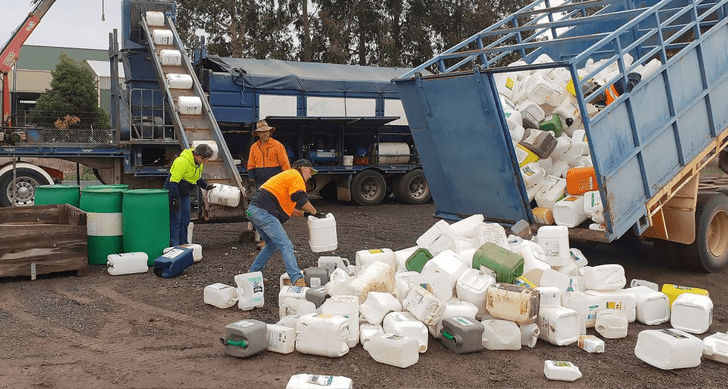
The drumMUSTER program has more than 840 collection points across Australia available to farmers and others which allow agvet chemical drums to be recycled, these days in a closed-loop system. Photo: drumMUSTER
AUSTRALIAN agriculture uses approximately 82,300 tonnes of plastic annually, with just over 12 percent currently being recycled.
This National Recycling Week, CropLife Australia as the peak national body for the plant-science sector, is calling on federal, state and territory governments to provide practical support for industries delivering real solutions towards a circular economy for agricultural plastics.
“Plastic packaging plays an essential role in the safe transport, use, and storage of critical agricultural products such as seeds, pesticides, and other inputs, but we must move beyond current recycling rates if we are to address agriculture’s plastic waste challenges effectively,” CropLife Australia chief executive officer Matthew Cossey said.
 CropLife’s drumMUSTER program alone contributes nearly half of the hard plastics recycled in agriculture, and the organisation is looking to expand collection initiatives and advocate for greater investment in advanced recycling infrastructure.
CropLife’s drumMUSTER program alone contributes nearly half of the hard plastics recycled in agriculture, and the organisation is looking to expand collection initiatives and advocate for greater investment in advanced recycling infrastructure.
Since it started 26 years ago, drumMUSTER has collected and recycled more than 43.5 million plastic containers, and diverted roughly 45,000t of plastic from landfill.
With a network of over 840 collection points, CropLife said drumMUSTER stands as a leading example of industry-led stewardship and, after a successful pilot, announcements around the roll-out of bagMUSTER are expected early next year.
Mr Cossey emphasised the importance of collaboration.
“Programs like drumMUSTER and bagMUSTER succeed due to the support of farmers, recycling businesses, local governments, and community groups.
“To fully tackle agricultural plastic waste, we need enhanced support from state and federal governments.
“This includes targeted investment in advanced recycling technologies and initiatives addressing hard-to-reach waste streams.”
Source: CropLife Australia